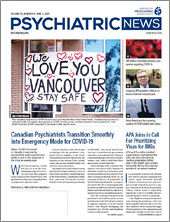Climate Psychiatry Alliance (CPA) members were invited to record four of the general session presentations for the APA On Demand CME program that was quickly organized after APA’s Board of Trustees determined that the 2020 Annual Meeting could not be held due to the COVID-19 pandemic. (Everyone should take advantage of all of the excellent scientific sessions that
APA On Demand is making available.) CPA’s contributions included sessions on the mental health impacts of excessive heat, racism and the climate crisis, the impacts on indigenous populations, and eco-anxiety and burnout stresses in climate scientists and specialists.
This last session focused on the impacts on “climate first responders.” These are climate scientists, mitigation and adaptation specialists, policy experts, disaster response personnel and planners, and advocates and activists who have long been concerned about the climate crisis. These individuals have a deep knowledge of the reality and urgency of global warming and acute concerns about the trajectory the planet and human civilization face if we don’t mount a swift corrective response. They live with an enormous burden of stress, so-called “toxic knowledge,” that contributes to overwhelming distress, especially when they are frequently confronted with public denial and disavowal of these issues.
The session reviewed the overall mental health impacts of the climate crisis, then focused on the particular stresses experienced by climate first responders and how widespread the prevalence of burnout is among them. The final segment of the session addressed the kinds of approaches that can be used to sensitively and supportively work with people who may request help in addressing their existential distress.
The discussant for this session was Richard Summers, M.D., APA treasurer, who expressed his deep appreciation of the knowledge and guidance that have been provided by the members of the CPA and the APA Caucus on Climate Change and Mental Health. He drew upon his expertise in the area of professional well-being and burnout to acknowledge the severity of these stressors on the people on whom we depend for effective scientific and policy guidance to steer the planet away from its self-destructive trajectory. He also shared an impressive list of seven constructive ideas for APA to address with regard to the broad range of climate- and health-related concerns that are within our area of clinical, organizational, and civic expertise. These suggestions include the following:
•
Draw upon the experience with and connections between the COVID-19 pandemic and the climate crisis to increase the understanding of APA members and other health and mental health professionals, as well as the general public, of the immediacy and urgency of the long-term, slow-moving threats of the climate crisis and the cascade of future acute disasters we can anticipate such as extreme weather events and infectious disease outbreaks.
•
Make an inventory of all the ways APA can reduce its organizational carbon footprint, for example, through more virtual meetings, and encourage members to do the same for their personal and professional spheres of activity.
•
Continue to more fully divest from fossil fuel investments, stimulated by the recent Board of Trustees decision to revise APA’s investment portfolio to account for the public health impact of divestment.
•
Elevate the Caucus on Climate Change and Mental Health to an APA committee to more fully identify and recommend ongoing actions for the organization and its members.
•
Educate members and mental health professionals to be part of the growing workforce of climate-informed clinicians who should be able to address such issues as climate-derived burnout, eco-anxiety, disavowal, and adaptation.
•
Continue to actively connect with our sister health professional societies to broaden the voice of reason and calls to action. One group through which APA works to achieve this goal is the Medical Society Consortium on Climate and Health.
•
Take advantage of our credibility as a leading health organization to help the general public become more aware and motivated to make addressing the climate crisis a part of our lives for current and future generations.
The CPA applauds Dr. Summers for his commitment to promoting these important initiatives within APA’s leadership. We also encourage anyone who wishes to join the Climate Psychiatry Alliance and the APA Caucus on Climate Change and Mental Health. ■
Those interested in joining the APA Caucus on Climate Change and Mental Health should send an email to Benjamin Doty at
[email protected].

